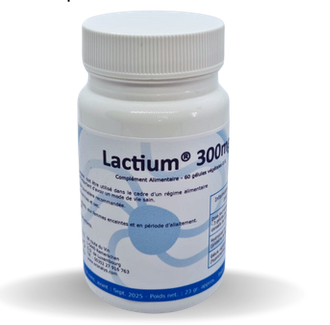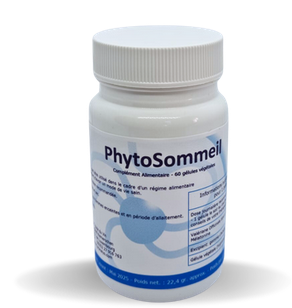Because we firmly believe that stress management and well-being are key elements for a fulfilling life, we are here to support you. Find our natural solutions to approach this new school year with confidence, calm and serenity.
400mg of elemental magnesium per dose 30 doses per jar
Magnesium is a mineral that helps promote muscle relaxation and relaxation of the nervous system. It can contribute to deeper, more peaceful sleep.
 Lactium® (Ref. 071.2) 60 capsules, €49
Lactium® (Ref. 071.2) 60 capsules, €49
300mg of Lactium®, patented material 60 capsules per jar
Lactium® is a natural anxiolytic, without addiction or sedation, which helps promote relaxation and better stress management. It influences the central nervous system by acting on GABA receptors.
 Phytosleep (Ref. 092.2), 60 capsules, €26
Phytosleep (Ref. 092.2), 60 capsules, €26
Combination of melatonin (3mg) and valerian (100mg).
Melatonin is a natural hormone that regulates the sleep-wake cycle. It is used to improve sleep quality and can help induce deeper sleep. Valerian is an herb used as a natural remedy for insomnia. It helps reduce anxiety.
 Lactocalm (Ref. 047.3) 90 capsules, €39
Lactocalm (Ref. 047.3) 90 capsules, €39
Association of ATA Mg® (acetyl-magnesium taurinate) (233mg), Lactium® (100mg), Vitamins B3 (5.5mg) and B6 (0.5mg).
Lactium® is associated with ATA Mg® (magnesium acetyl taurinate), a bioavailable form of magnesium and taurine, and group B vitamins. This formulation aims to promote relaxation, reduce stress, neuro -inflammation and improve sleep quality.
We recommend that you do not exceed the recommended daily doses and follow the recommendations of your healthcare professional.
Our well-being advice
- Regular physical activity: Physical activity can contribute to deeper, more restful sleep. Try to exercise regularly, but avoid strenuous activity right before bed.
- Relaxation and meditation: Practicing meditation, yoga, or other relaxation techniques can help reduce stress and anxiety, which promotes deeper sleep.
- Avoid caffeine and alcohol: Limit or avoid caffeine and alcohol consumption, especially late in the day, as these substances can disrupt sleep.
- Maintain a regular sleep routine: Try going to bed and getting up at the same time every day, even on weekends, to regulate your body clock.
- Create a conducive sleep environment: Make sure your bedroom is dark, quiet and cool.
- Avoid screens before bed: the blue light emitted by screens can disrupt melatonin production. Avoid them at least an hour before bed.

 How to boost your immune system in winter: advice and solutions
How to boost your immune system in winter: advice and solutions
 Discover how we make your supplements - episode 1
Discover how we make your supplements - episode 1
 NEW - Palmitoylethanolamide (PEA)
NEW - Palmitoylethanolamide (PEA)
 WINTER PACK - Change of season
WINTER PACK - Change of season
 Video of the month - Hypercoagulation by Bruno Lacroix - October 2023
Video of the month - Hypercoagulation by Bruno Lacroix - October 2023
